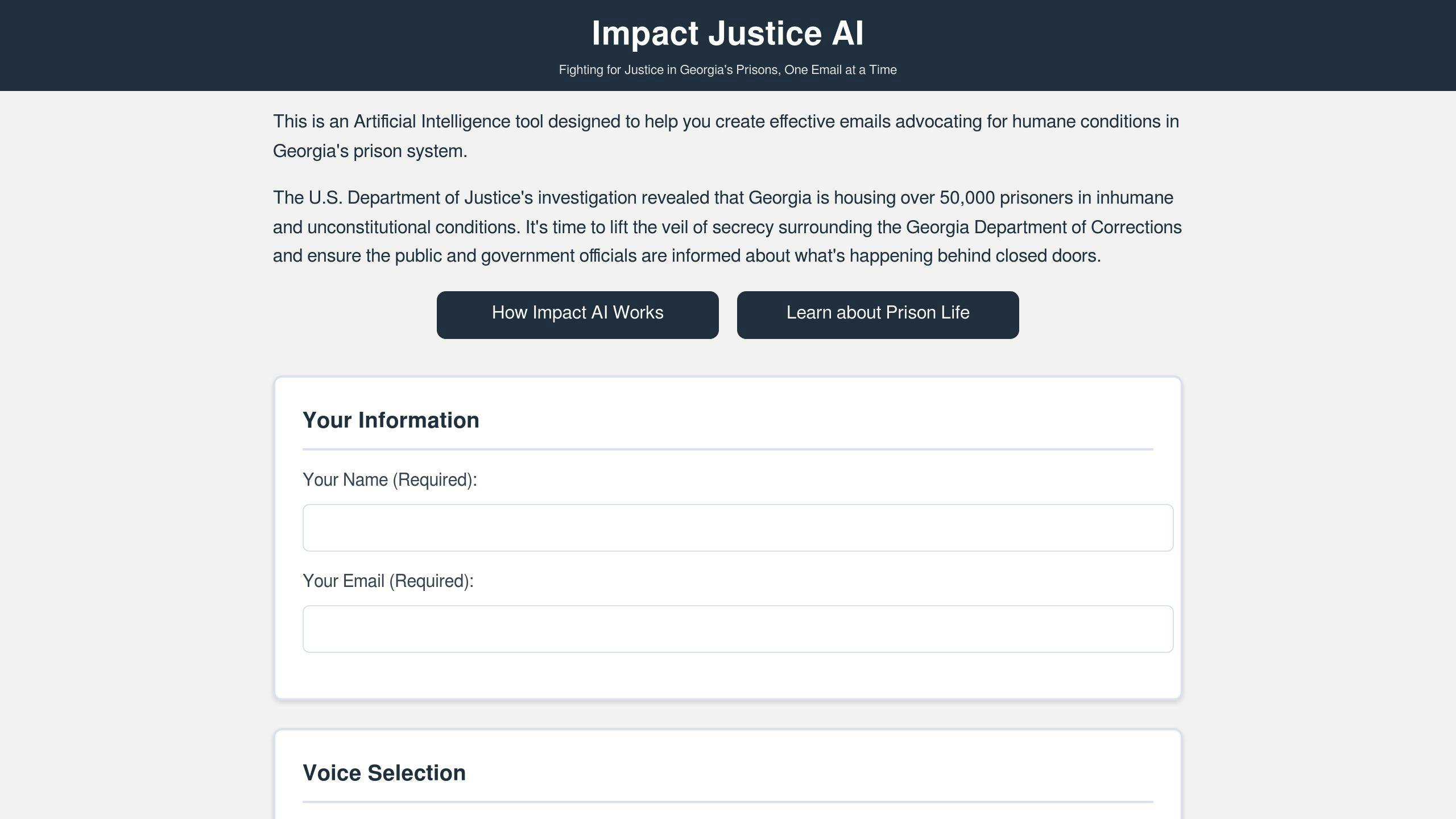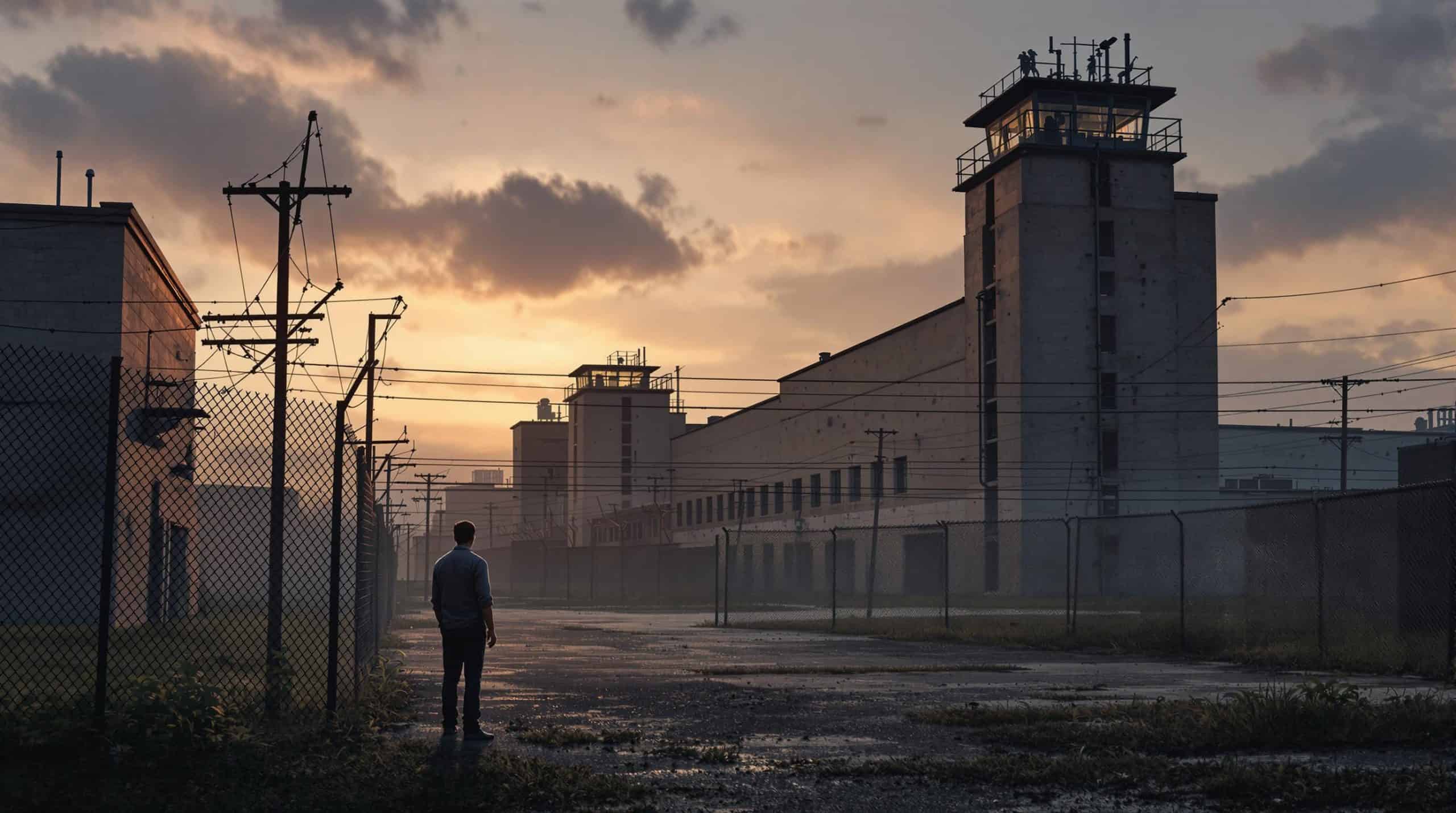The Department of Justice (DOJ) investigation into Georgia’s prisons reveals alarming issues: extreme violence, preventable deaths, and staff misconduct. Key findings include:
- Violence and deaths: Unchecked violence, gang activity, and underreported homicides.
- Staffing shortages: Over half of correctional officer positions unfilled, leading to poor oversight.
- At-risk inmates: Vulnerable groups face higher risks of abuse and neglect.
- Legal actions: Court-ordered reforms and gang-related indictments are underway.
- Proposed changes: Improved accountability, increased staffing, and better mental health services.
Advocacy groups and new tools like Impact Justice AI are pushing for real reforms to address these systemic failures.
New DOJ report cites abuses in Georgia’s prisons
Main Findings from the DOJ Report
Violence and Deaths in Georgia Prisons
The Department of Justice (DOJ) investigation uncovered a troubling pattern of extreme violence and preventable deaths within Georgia’s prison system. The Georgia Department of Corrections (GDC) was described as being overrun by criminal activity and violence [3]. Investigators found widespread issues, including drug use, extortion, and sexual abuse, alongside a consistent failure to report serious incidents and homicides accurately [2]. This lack of transparency concealed the full scope of the crisis.
Problems with Staffing and Oversight
Georgia prisons are facing severe staffing shortages, with more than half of correctional officer positions unfilled. This has led to inadequate supervision, increased safety risks, and restricted access to essential services, all of which contribute to escalating violence and criminal behavior [2][5]. Adding to these problems, the DOJ reported that "hundreds of GDC officers have been arrested on criminal charges" for misconduct inside the prisons [3]. These findings highlight a deep systemic breakdown in oversight and accountability, leaving inmates – especially those most vulnerable – at greater risk in an already dangerous environment.
Impact on At-Risk Inmates
The DOJ concluded that GDC’s failures have placed inmates at significant risk of harm [3]. Vulnerable groups, including LGBTI inmates and those with mental illnesses or disabilities, face an even higher likelihood of violence and abuse due to inadequate protections [2]. These systemic flaws not only jeopardize the safety of these individuals but also contribute to criminal activity spilling beyond prison walls, straining public safety resources and underscoring the urgent need for reforms [3].
sbb-itb-25113a2
Advocacy Efforts and Tools for Action
Advocacy Groups and Public Efforts
The Southern Center for Human Rights and Ignite Justice have played a major role in bringing attention to problems within Georgia’s prison system [1]. Their work has prompted changes, such as the creation of a seven-member Senate committee tasked with reviewing the Department of Corrections’ operations [4]. These groups collaborate closely with inmates, collecting evidence of abuse and violence to push for legal actions and demand policy reforms.
To shed light on prison conditions, advocacy groups have turned to creative methods like using contraband cellphone footage to reveal corruption and violence. While prison officials often cite security concerns to oppose these tactics, they have been instrumental in addressing the systemic failures identified in the DOJ investigation, especially those tied to poor oversight and risks to vulnerable inmates [1][2][5].
Using Impact Justice AI for Advocacy

Impact Justice AI takes advocacy to the next level by equipping individuals with tools to support prison reform efforts. This AI-driven platform simplifies the process by creating tailored emails, focusing on specific reform issues, and enabling secure communication with key decision-makers.
The tool complements the work of established organizations while empowering everyday citizens to act. This approach is especially timely, as the Senate committee is set to present its findings and recommendations to the General Assembly during the 2025 legislative session [4].
Legal and Policy Outcomes of the DOJ Report
Court-Ordered Reforms and Lawsuits
The Department of Justice’s investigation has sparked major legal actions targeting the Georgia Department of Corrections (GDC). Violations of the Eighth Amendment have led to court-ordered reforms aimed at addressing the failure to protect incarcerated individuals from violence and harm [2][3].
Federal authorities have stepped in, as highlighted by a November 2023 indictment of 23 individuals tied to gang-related crimes across six facilities [2]. This underscores the deep, systemic issues plaguing Georgia’s correctional system.
"The state fails to take appropriate steps to provide reasonable protection from harm to the incarcerated people in its custody." – Department of Justice, Findings Report [2]
These legal actions are paving the way for policy initiatives designed to tackle the systemic problems identified by the DOJ.
Policy Changes and New Laws
The DOJ’s findings have spurred key policy changes within Georgia’s prison system. Reforms are targeting critical areas, such as:
| Policy Area | Current Issues | Proposed Changes |
|---|---|---|
| System-wide Accountability | Officer arrests and poor supervision | Better monitoring systems and stricter background checks |
| Violence Prevention | Numerous unreported violent incidents | Improved incident reporting and transparency measures |
The Georgia General Assembly is reviewing legislation to address these pressing concerns, with a focus on increasing staffing levels and expanding mental health services for inmates [6][2]. The DOJ has emphasized the need to address violence, staff accountability, and flawed reporting systems to create safer prison environments [3][2].
Efforts to curb crimes originating from prisons now involve closer collaboration between state and federal law enforcement agencies. However, the GDC has resisted transparency, delaying document releases and limiting facility access. This has led to demands for stricter compliance measures and regular external audits [3][2].
Advocacy groups and tools like Impact Justice AI are playing a key role in ensuring these reforms are implemented and monitored effectively as Georgia’s prison system undergoes these critical changes [2][3].
Conclusion: Next Steps for Reform
Key Takeaways from the DOJ Report
The Department of Justice (DOJ) investigation uncovered severe issues within Georgia’s prisons, highlighting failures that violate constitutional rights. These include unchecked violence and misconduct among staff. With hundreds of officers facing criminal charges, the findings reveal an urgent need for better accountability and staffing reforms [2][3].
Assistant Attorney General Kristen Clarke stressed the importance of safeguarding constitutional rights, stating:
"At the end of the day, people do not abandon their civil and constitutional rights at the jailhouse door" [7].
These findings point to the necessity of sustained advocacy and new tools to push for real reform.
The Role of Advocacy and Tools Like Impact Justice AI
Advocacy has proven to be a powerful force for change in Georgia’s prison system. Groups like The Southern Center for Human Rights have used testimony from incarcerated individuals to demand systemic improvements. Meanwhile, AI-powered tools such as Impact Justice AI are helping amplify public involvement in these reform efforts.
| Reform Focus | Advocacy Objectives |
|---|---|
| Staff Oversight | Push for stricter accountability measures |
| Reducing Violence | Strengthen security protocols |
| Transparency | Advocate for independent audits |
Impact Justice AI is helping bridge the gap between grassroots movements and decision-makers, making it easier to address specific reform issues. By combining community advocacy, legal strategies, and tools like Impact Justice AI, reformers can work to ensure the DOJ’s findings translate into meaningful, lasting improvements.
Efforts that blend legal action, policy reform, and community-driven advocacy – enhanced by modern tools – offer the strongest path forward for addressing the deep-rooted issues in Georgia’s prison system [2][3].
Related posts
- A Budgetary Black Hole: The True Cost of Neglecting Georgia’s Prisons: Demonstrating how unchecked corruption, violence, and healthcare failures drain state resources.
- Public Safety at Risk: How Georgia’s Prison Crisis Threatens Communities Beyond the Bars: Highlighting the spillover effects of gang violence and escapes on public safety in Georgia.
- The Price of Silence: Why Transparency in Georgia Prisons is Crucial for Accountability: Advocating for policy changes to ensure access to information about prison conditions and incidents.
- Broken Locks, Broken System: The Urgent Need for Staffing Reform in Georgia Prisons: Calling attention to how extreme understaffing endangers guards, inmates, and the public.

